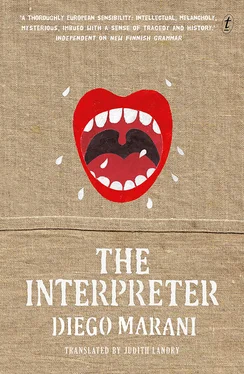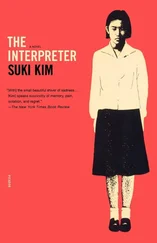Throwing a few clothes at random into a suitcase, I left one morning in late September. Heavy of heart, I looked back through the darkness at my house from a rise in the road. Would I ever be seeing it again? Would I ever go back to tend my roses, would I ever return to my old reassuring groove? At that moment, all seemed to be lost forever. The plane to Munich was almost empty; the autumn sun fell glancingly through the little windows and, as I slumped into my seat, I remembered the peaceful hours of distant afternoons, punctuated by the untroubled hum of radiators and warmed by the busy presence of Irene. I had the brief sensation that what I was embarking on was utterly absurd, that in reality my illness was pure fiction, that it had all been a passing frenzy brought on by loneliness. I was going to lock myself up among lunatics, I was putting myself into the hands of a neurologist who was eccentric to say the least, submitting myself to a course of treatment about which I knew precisely nothing. But suddenly, at that very moment, uncontrollable whistling and gurgling noises sprang from my mouth, truncated words pronounced in a voice which was not my own, while my neighbour looked at me in alarm, then hid his face behind his quivering newspaper. I wanted to cry out, to call for help, to tell someone about the fearful ill that was devouring me. I tried to catch the hostess’s eye as she passed by with the drinks trolley; she had strong hands and her face was strangely lined, as though she had slept on a rumpled sheet; her lips and eyelids were smeared with oily make-up. She looked at me severely, as though she had noticed my lapse and wanted to reproach me for it. For a moment, I had the absolute conviction that I was part of some vast and faultlessly orchestrated set-up, that the hostess herself was a nurse working for Dr Barnung, deputed to work on this specific plane and on no other; those hard eyes of hers, those gnarled hands, those strange wrinkles were all designed to strike fear into me, the kind of fear that renders animals docile as they are herded into the abattoir. I drank my fruit juice obediently and bent my head in resignation. I fell into sleep as though into a swoon. In my dreams, Dr Barnung was cackling, laying his gnarled, clasped hands upon the table while, behind him, the window overlooking the garden lit up with a strange glow.
‘I see that you’ve settled for the wiser course!’ he noted, ushering me into his study. ‘You’ll see — you won’t regret your choice. This place is made for you; you’ll soon be right as rain.’ At that moment, a thin woman came into the room, wearing a long white coat revealing only forearms and calves hairless as eggs; sheathed as it was in thin yellow stockings, her skin had something sickly about it, and for me that colour instantly became a smell — of a dried-up wound, an antiseptic ointment. The woman gave me a slightly servile smile, like that of maid to master, then gestured sharply towards the door she had left half-open behind her.
Escorted by the nurse, I went down long, white-painted corridors where total silence reigned; a smell of the schoolroom wafted from such few doors as had been left open, and I caught a glimpse of listening stations shielded by insulating panels, with rows of headphones hanging from hooks. The floors were covered in soft linoleum which sank beneath my feet as I walked. We went up to the third floor and through a door bearing a notice with the words Deutsche Abteilung . My room gave onto an inner courtyard with a small square lawn crossed by little gravel paths; the furnishing was simple but carefully chosen, all in light wood. The nurse opened a cupboard door and handed me a set of sheets and towels; then, after looking me up and down, she started rummaging among the coathangers until she found a blue uniform which she then laid out on the bed, attaching a small strip of red material to the press studs on the pocket.
‘This is the uniform of the German section. You have to wear it during the therapy sessions, in the refectory and in all communal spaces,’ she informed me.
‘And what does that red strip on the pocket mean?’ I asked, running my hands over the rough cotton uniform.
‘It means that you’re not allowed to speak French. No one must ever address you in that language, and you must never use it to communicate with the other patients. You’ll find all the explanations you need in that handbook,’ the woman told me, pointing to a booklet on the table.
‘Supper is at seven. The German refectory is on the ground floor, at the end of corridor B,’ she added, before closing the door behind her. Alone at last, I sat down and started leafing through the clinic handbook, a small volume with the text printed in German on shiny paper, interspersed with images of the clinic and surrounding park; the cover bore a photograph of the medical staff assembled in the courtyard. I recognised Dr Barnung, sitting in the back row with his shirt unbuttoned, next to the nurse who had shown me to my room. A brief introduction explained the principles of linguistic therapy, following the line taken by Dr Barnung when he had briefly explained it to me, but going into matters in greater depth. I now discovered that each language had a colour, as did the relevant treatment rooms, refectories and corridors. An index card with my name on it informed me that I was to present myself at the yellow laboratory — the one for Romanian — tomorrow morning at nine on the dot, and a map of the building showed me the route I would be taking to get there, also shown in yellow. The clinic made use of three languages for introductory purposes — German, French and Russian — and each such language had its own uniform — blue for German, red for French and green for Russian. These languages served as a sort of gymnastics, a warm-up for the muscles of the brain, but also to prepare the patients for the specific cure that they would undergo, and lastly as a sort of fixative, since their practice would reinforce the results obtained in the patients’ minds by the therapeutic languages. These latter were much more numerous than the introductory ones, and furthermore they required periods of isolation when courses in languages defined as dangerous would be administered, marked by the colour white. I closed the handbook and looked out of the window. Darkness had fallen and the lights were on in many windows; torches were burning in the courtyard. I picked up my uniform from the bed, unbuttoned the tunic and put it on; looking at my reflection in the mirror, encased in the rough fabric of a garment that was only approximately my size, for the first time I felt truly ill.
Each patient had a numbered place in the refectory; my table was next to a large window overlooking the courtyard. My fellow diners, four men and a woman, had already begun their meal.
‘Join the throng,’ said my neighbour, rising to greet me. ‘My name’s Ortega,’ he added, shaking my hand warmly. ‘And may I introduce Mr Vidmajer, Colonel Kwiatkowski, Mr Vandekerkhove and Mrs Popescu.’ They greeted me with a nod. The oldest of the group, Colonel Kwiatkowski, lifted his eyes from his plate, dried his mouth carefully with his napkin and stared at me at some length; his face was a maze of wrinkles and his almost white eyes were scarcely visible beneath his fleshy eyelids. I noticed a whole thicket of coloured strips on his jacket pocket.
‘Another one who mustn’t speak French! So what’s happening to all those French speakers out there?’ he burst out in annoyance before dipping his spoon back into his soup.
Mr Ortega smiled, to let me know that I shouldn’t take the old colonel too seriously.
I too began to eat my soup in silence, exchanging friendly looks with my neighbour from time to time.
‘By now, almost all the French speakers from the old continent are locked up in here!’ commented Mr Vandekerkhove after a pause, to general indifference. He had very short red hair, and it was hard to guess his age; his freckly face was creased into a permanent half-smile. He wore a pair of small, round glasses, which did not serve to correct any fault in his vision, but which his face quite simply could not have done without. Kwiatkowski shot him a nasty look which failed to upset his bovine calm. The clinking of cutlery gained the upper hand and mingled with the faint buzz which was coming from the other tables.
Читать дальше












